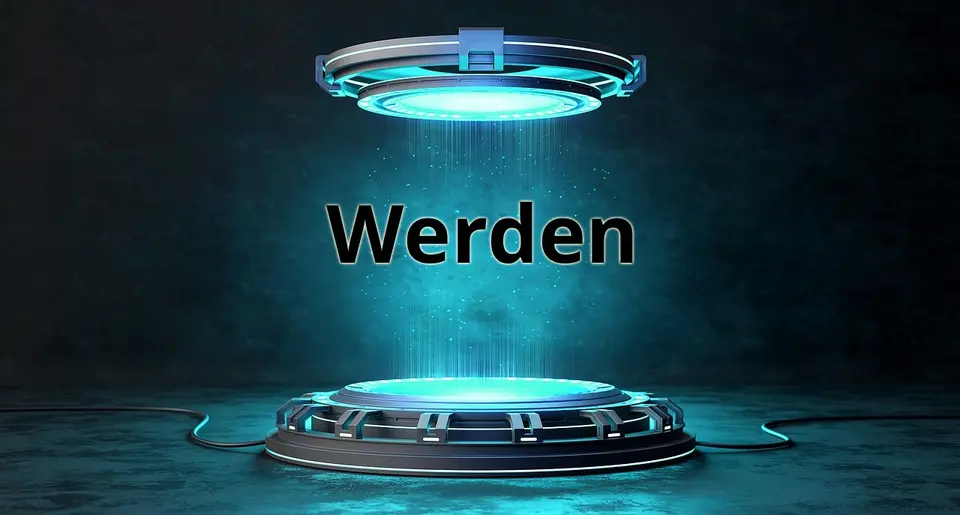Forming the Future Tense with the German Verb "Werden"

The German verb "werden" is one of the most important verbs for beginners learning German. It is highly versatile and appears in many contexts, including expressing change (to become), forming the future tense (Futur I) and creating the passive voice. Understanding werden is essential for A1 learners who want to speak and write correctly in German.
What Does "Werden" Mean in German?
The verb "werden" has three main uses:
To become / change
To talk about the future (future tense)
To form passive sentences (passive voice)
1. Using "Werden" to Say "To Become"
One of the most common uses of werden is to describe a change or transformation. You can use it to say someone or something is becoming something else.
Examples:
Ich werde müde. → I am becoming tired.
Er wird Arzt. → He becomes a doctor.
Es wird dunkel. → It is getting dark.
2. Using "Werden" for the Future Tense (Futur I)
In German, werden is essential for talking about the future. The structure is:
Examples:
Ich werde morgen arbeiten. → I will work tomorrow.
Wir werden bald reisen. → We will travel soon.
This is the most common way to express future actions in German.
Conjugation of Verb "Werden" (Konjugation)
Werden in the Present Tense (Werden im Präsens)
Person | Conjugation |
|---|---|
ich | werde |
du | wirst |
er/sie/es | wird |
wir | werden |
ihr | werdet |
sie/Sie | werden |
Example:
Du wirst groß. → You are becoming tall.
✨Uses of Futur I
Talking about the future:
Wir werden morgen ins Kino gehen. → We will go to the cinema tomorrow.Making a prediction:
Es wird bald regnen. → It will rain soon.Expressing an assumption:
Sie wird wohl zu Hause sein. → She is probably at home.
Composing Questions with "Werden"
In German questions in Futur I are formed in two main ways:
Yes/No Questions
👉 Start with the conjugated form of werden, then subject, then other parts and put the infinitive at the end.
Example:
Wirst du morgen lernen? → Will you study tomorrow?
Wird es am Wochenende regnen? → Will it rain on the weekend?
W-Questions (Information Questions)
👉 Start with a question word (Wann, Was, Wo, Wer …), then werden + subject and infinitive at the end.
Examples:
Wann wirst du deine Freunde treffen? → When will you meet your friends?
Was wird deine Schwester nach der Schule machen? → What will your sister do after school?
Wo werdet ihr Urlaub machen? → Where will you go on vacation?
3. Using "Werden" for the Passive Voice
Werden is also used to form the passive voice in German. The passive voice focuses on the action rather than who performs it.
Structure:
Examples:
Das Haus wird gebaut. → The house is being built. (Present Tense)
Der Brief wurde geschrieben. → The letter was written. (Past Tense)
Das Problem wird gelöst werden. → The problem will be solved. (Future Tense)
✍️ Quiz: Futur I with werden
A) Fill in the blanks with the correct form of werden
Ich ______ morgen meine Oma besuchen.
Du ______ am Samstag Fußball spielen.
Er ______ bald eine neue Wohnung finden.
Wir ______ im Sommer nach Italien reisen.
Ihr ______ die Prüfung bestimmt bestehen.
B) Make questions in Futur I
(ihr / ins Kino gehen / morgen) → __________________________?
(wann / du / deine Hausaufgaben machen) → __________________________?
(sie / ein Auto kaufen / nächstes Jahr) → __________________________?
(wo / wir / wohnen / in der Zukunft) → __________________________?
(es / regnen / heute Abend) → __________________________?
✅ Answers
A) Correct form of werden
werde → Ich werde morgen meine Oma besuchen.
wirst → Du wirst am Samstag Fußball spielen.
wird → Er wird bald eine neue Wohnung finden.
werden → Wir werden im Sommer nach Italien reisen.
werdet → Ihr werdet die Prüfung bestimmt bestehen.
B) Questions in Futur I
Werdet ihr morgen ins Kino gehen? → (Will you go to the cinema tomorrow?)
Wann wirst du deine Hausaufgaben machen? → (When will you do your homework?)
Wird sie nächstes Jahr ein Auto kaufen? → (Will she buy a car next year?)
Wo werden wir in der Zukunft wohnen? → (Where will we live in the future?)
Wird es heute Abend regnen? → (Will it rain this evening?)
Sophia is a certified German language expert (Goethe & telc) with over eight years of experience helping learners master German. She specializes in creating high-quality digital learning materials and writing informative articles, while teaching German and preparing students for exams – bringing practical, real-world language skills to every lesson.